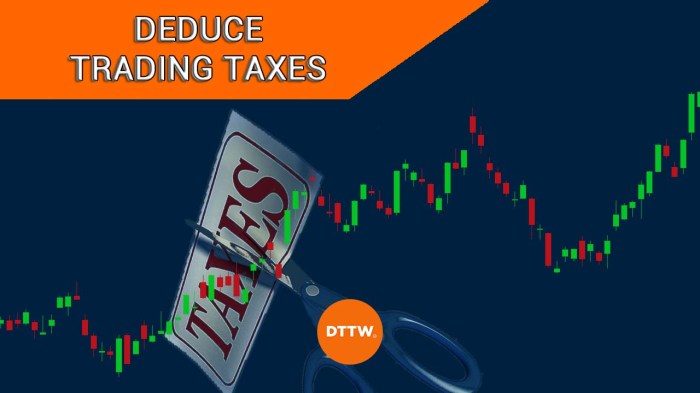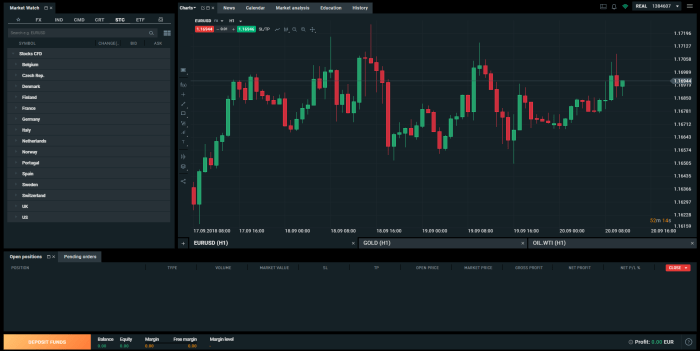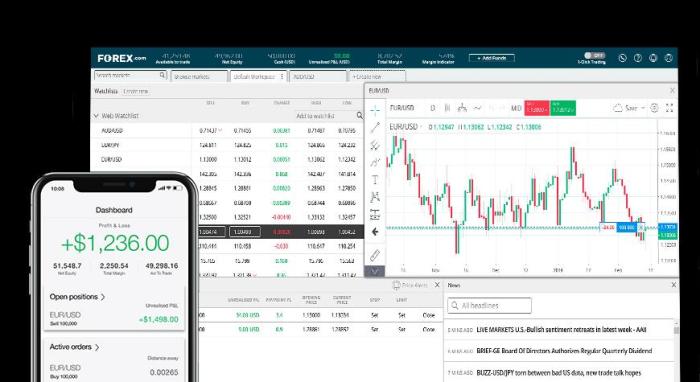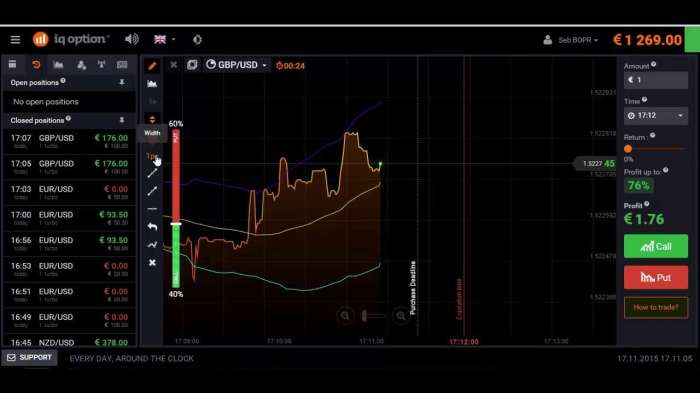
Forex trading and taxes: Navigating the world of foreign exchange trading can be lucrative, but understanding the tax implications is crucial to avoid hefty penalties. This isn’t just about crunching numbers; it’s about strategically managing your financial gains and losses to maximize your profits. We’ll demystify the complexities of forex tax regulations, offering clear explanations and practical advice to help you stay compliant and financially savvy.
From different account types and their tax implications to calculating taxable income and claiming deductions, we’ll cover it all. We’ll explore record-keeping best practices, delve into various trading strategies and their tax consequences, and even guide you on when to seek professional tax advice. Get ready to level up your forex game with a solid understanding of the tax landscape.
Understanding Forex Trading for Tax Purposes
Navigating the world of forex trading can be exciting, but understanding the tax implications is crucial for avoiding costly surprises. This guide breaks down the complexities of forex taxes, helping you stay compliant and keep more of your profits. Remember, this information is for general understanding and doesn’t constitute financial or legal advice; always consult with a qualified professional.
Forex Trading Account Types and Tax Implications
The type of forex trading account you use significantly impacts your tax obligations. Generally, accounts are categorized as personal or business accounts. Personal accounts treat forex trading as a hobby or investment, while business accounts classify it as a business activity. Personal accounts often have simpler tax reporting requirements, with profits taxed as capital gains or ordinary income depending on the jurisdiction and holding period. Business accounts, on the other hand, require more detailed record-keeping and may involve deductions for business expenses, leading to potentially lower overall tax burdens, but with increased administrative complexity. The specific tax treatment varies greatly depending on your location.
Forex Tax Regulations in Different Jurisdictions
Tax regulations concerning forex trading differ significantly across countries.
United States
In the US, forex trading profits are generally taxed as ordinary income, meaning they’re subject to your individual income tax rate. Losses can be deducted against other ordinary income, but there are limitations. Detailed record-keeping is essential, including transaction records, account statements, and supporting documentation. The IRS considers forex trading a business if it’s conducted regularly and systematically with the intent to profit.
United Kingdom
In the UK, forex trading profits are typically taxed as either capital gains or income tax, depending on factors such as trading frequency and the level of professional involvement. Capital gains tax applies to profits from infrequent trading activities, while income tax applies to more frequent and professional trading. Losses can be offset against profits, but there are limits.
Canada
In Canada, the tax treatment of forex trading profits depends on whether the activity is considered a business or a personal investment. If it’s a business, profits are taxed as business income, and expenses can be deducted. If it’s considered a personal investment, profits are taxed as capital gains, with only half of the gain being taxable. Record-keeping requirements are stringent in both cases.
Examples of Forex Trading Transactions and Tax Treatments
Let’s illustrate with some common scenarios.
Scenario 1: A US-based trader buys 10,000 EUR at 1.10 USD/EUR and sells them later at 1.15 USD/EUR. The profit is (1.15-1.10) * 10,000 = 500 USD, taxed as ordinary income.
Scenario 2: A UK-based trader makes a small profit from a single forex trade held for over a year. This profit would likely be treated as a capital gain, taxed at a lower rate than ordinary income.
Scenario 3: A Canadian trader, operating as a registered business, buys and sells currency pairs multiple times a day. Their profits are taxed as business income, allowing for the deduction of various business-related expenses.
Comparison of Forex Trading Tax Rates
| Country | Tax Rate (Example – May Vary Based on Income Bracket) | Tax Treatment | Notes |
|---|---|---|---|
| USA | 10-37% (Ordinary Income) | Ordinary Income | Rates vary significantly based on income bracket |
| UK | 10-20% (Capital Gains), up to 45% (Income Tax) | Capital Gains or Income Tax | Depends on trading frequency and professional status |
| Canada | 50% of Capital Gains taxed at marginal rate, Business Income taxed at marginal rate | Capital Gains or Business Income | Depends on whether it is considered a business or personal investment. |
Record Keeping and Documentation for Forex Traders
Navigating the world of forex trading is exciting, but it’s crucial to remember that meticulous record-keeping is not just a good idea—it’s a legal necessity. Proper documentation protects you from potential tax audits and ensures you accurately claim all allowable deductions. Failing to maintain adequate records can lead to hefty penalties and unnecessary stress. Let’s dive into how to build a robust system for tracking your forex transactions.
Effective record-keeping for forex trading hinges on detailed transaction tracking and secure storage. The key is to create a system that’s easy to understand, consistently updated, and readily accessible should you need it for tax purposes or personal financial review. This involves more than just screenshots; it requires a structured approach to capture all relevant data points.
For descriptions on additional topics like live forex trading graphs, please visit the available live forex trading graphs.
A Sample Record-Keeping System for Forex Transactions
A simple spreadsheet or dedicated forex trading journal can serve as the backbone of your record-keeping system. Consider including columns for: Date, Transaction Type (Buy/Sell), Currency Pair (e.g., EUR/USD), Amount Traded (in base currency), Entry Price, Exit Price, Commission/Fees, Profit/Loss, and Notes (any relevant details like trading strategy employed). Regularly backing up this data to a secure, cloud-based storage solution is highly recommended. For larger trading volumes, specialized forex accounting software might be a more efficient solution.
Best Practices for Organizing and Storing Forex Trading Records
Organize your records chronologically, ideally by year and then by month. Maintain both electronic and physical copies of crucial documents. For electronic records, utilize cloud storage services with robust security features like password protection and two-factor authentication. Physical records should be stored in a fireproof and secure location. Consider using a filing system that allows for easy retrieval of specific documents based on date or transaction type. Regularly review and update your records to ensure accuracy and completeness.
The Importance of Accurate and Detailed Transaction Records for Tax Purposes
Accurate and detailed transaction records are paramount for accurate tax reporting. They provide irrefutable evidence of your trading activities, allowing you to correctly calculate your taxable income and claim any applicable deductions. In the event of an audit, well-maintained records significantly reduce the risk of penalties and disputes with tax authorities. The level of detail required may vary depending on your jurisdiction, but generally, the more detailed your records, the better.
Essential Documents for Forex Tax Reporting
A comprehensive checklist of essential documents includes: Brokerage statements detailing all transactions (including fees and commissions), trade confirmations for each individual trade, bank statements showing deposits and withdrawals related to forex trading, and any relevant documentation supporting claimed deductions (e.g., expenses related to forex education or software subscriptions). Retain these documents for at least seven years, as per the general tax record retention guidelines in most jurisdictions (although this may vary; consult your local tax regulations for precise details).
Calculating Taxable Income from Forex Trading
Navigating the tax implications of forex trading can feel like navigating a maze, but understanding the basics of calculating your taxable income is the first step to avoiding a headache (and potentially hefty penalties) down the line. This section breaks down the process, clarifying how capital gains and losses are handled, and highlighting common pitfalls to avoid.
The core principle is simple: profits from forex trading are considered capital gains, and losses are considered capital losses. However, the specifics of calculation depend on your location and the specific rules of your tax jurisdiction. This explanation provides a general overview and should not be considered professional tax advice. Always consult with a qualified tax professional for personalized guidance.
Remember to click forex social trading to understand more comprehensive aspects of the forex social trading topic.
Capital Gains and Losses Calculation
Calculating your capital gains and losses involves determining the difference between the proceeds from a sale (the amount you received when you closed your position) and your cost basis (the original price you paid for the currency pair). For example, if you bought 1,000 units of EUR/USD at 1.10 and sold them at 1.12, your profit per unit is 0.02 USD. Multiplying this by 1,000 units gives you a total profit of 20 USD. This profit is then subject to capital gains tax according to your tax bracket. Conversely, if you had sold at 1.08, you would have a capital loss of 20 USD.
Offsetting Forex Trading Losses
In many jurisdictions, capital losses from forex trading can be used to offset capital gains from other investments. This can significantly reduce your overall tax liability. The specific rules for offsetting losses vary by location; some allow you to offset losses against gains in the same year, while others may allow you to carry forward losses to future tax years. For instance, if you had a 20 USD loss from your EUR/USD trade and a 50 USD gain from stock investments in the same tax year, your net capital gain would be 30 USD, and you would only pay capital gains tax on that amount. However, if your losses exceed your gains, the rules for carrying forward the excess loss will be dependent on your specific tax regulations.
Cost Basis Calculation in Forex Trading
Determining the cost basis of a forex trade is crucial for accurate tax reporting. It typically includes the initial purchase price of the currency pair, plus any commissions or fees paid. For example, if you bought 1,000 units of GBP/USD at 1.25, and paid a commission of 5 USD, your total cost basis would be (1,000 units * 1.25 USD/unit) + 5 USD = 1255 USD. This needs to be recorded meticulously for every trade, ensuring you accurately reflect the total cost for each transaction. Accurate record-keeping is key to avoiding discrepancies and potential audits.
Common Errors in Calculating Forex Trading Income
One common error is failing to accurately track all trades and associated fees. Another frequent mistake is neglecting to account for currency conversions if you’re trading across different currencies. For example, if you’re trading in EUR and your tax return is filed in USD, you must accurately convert your profits and losses into USD using the prevailing exchange rate at the time of the transaction. Inconsistent or inaccurate record-keeping leads to difficulties in accurately calculating taxable income. Furthermore, overlooking the different tax treatment of short-term versus long-term capital gains (depending on how long you held the position) is another frequent mistake. Properly categorized records and seeking professional tax advice can mitigate these errors.
Tax Deductions and Allowances for Forex Traders

Navigating the tax landscape as a forex trader can feel like navigating a labyrinthine maze. But understanding allowable deductions can significantly reduce your tax burden, turning that maze into a more manageable path. This section Artikels key deductions and allowances available to forex traders, offering clarity on how to legitimately minimize your tax liability.
Home Office Expenses
Forex trading, unlike many traditional jobs, often happens from home. If you dedicate a specific area of your home exclusively to trading, you can deduct a portion of your home-related expenses. This includes mortgage interest, rent, utilities, insurance, and repairs, all proportionally allocated to your trading space. For example, if your home office occupies 10% of your total home square footage, you can deduct 10% of your eligible home expenses. Proper documentation, such as detailed records of your home’s square footage and usage, is crucial for claiming this deduction. The IRS has specific guidelines regarding the qualification of a home office, so careful adherence to these rules is paramount.
Trading Software and Subscription Costs
The forex market is data-driven. The costs associated with software and subscriptions essential for your trading activities are generally deductible. This includes charting software, trading platforms, market data feeds, and educational resources directly related to improving your trading skills. Keep meticulous records of all software purchases and subscription fees, including invoices and receipts. Remember, only expenses directly related to your trading activities are deductible; general computer maintenance or software unrelated to forex trading is not.
Capital Losses
Forex trading, like any investment, involves risks. Losses incurred are not simply written off; they can be used to offset capital gains. This means that if you experienced losses on some forex trades, you can deduct those losses against profits from other profitable trades, potentially reducing your overall taxable income. However, there are limitations on the amount of capital losses you can deduct in a single year; any excess losses can usually be carried forward to reduce your tax liability in future years. Accurate record-keeping is essential to track both gains and losses for proper calculation.
Other Potential Tax Deductions
A range of other expenses might be deductible, depending on your specific circumstances. These could include:
- Professional Fees: Fees paid to financial advisors, tax professionals, or other consultants specifically for advice related to your forex trading.
- Education and Training: Costs associated with courses, seminars, or workshops directly enhancing your forex trading skills.
- Travel Expenses (Limited): Travel expenses incurred for attending forex-related conferences or educational events, subject to specific IRS guidelines.
- Internet and Phone Expenses (Proportionate): A portion of your internet and phone bills, if used predominantly for forex trading.
It’s crucial to understand that the deductibility of expenses can vary depending on individual circumstances and IRS regulations. Consulting with a qualified tax professional is highly recommended to ensure you are claiming all allowable deductions and complying with all tax laws. Remember, accurate record-keeping is the cornerstone of successful tax preparation for forex traders.
Reporting Forex Trading Income to Tax Authorities: Forex Trading And Taxes
Navigating the world of forex trading taxes can feel like navigating a maze, but understanding how to report your income correctly is crucial. Failing to do so can lead to significant penalties, so let’s break down the process step-by-step, focusing on clarity and accuracy. This section will provide a general overview; specific regulations vary widely by country, so always consult with a qualified tax professional for personalized advice.
Reporting Forex Trading Income: A Step-by-Step Guide
Reporting your forex trading income involves meticulously tracking your transactions, calculating your profits and losses, and accurately reflecting this information on your tax return. The exact process varies depending on your country of residence. Generally, it involves gathering all necessary documentation, completing the relevant tax forms, and submitting them by the designated deadline.
Examples of Correctly Filled Tax Forms, Forex trading and taxes
Unfortunately, providing specific examples of correctly filled tax forms is impossible without knowing your specific country and tax year. Tax forms vary significantly between countries and are often updated regularly. However, a correctly filled form will generally include details such as your personal information, a complete record of all forex transactions (including dates, currencies traded, exchange rates, and the amount of profit or loss on each trade), and a summary of your total profits and losses for the tax year. Many tax authorities provide sample forms and guides on their websites to assist taxpayers.
Penalties for Non-Compliance with Forex Trading Tax Regulations
The penalties for failing to report forex trading income accurately and on time can be substantial. These penalties can range from late filing fees to interest charges on unpaid taxes and, in severe cases, even criminal prosecution. The specific penalties vary depending on the jurisdiction, the amount of unreported income, and the nature of the non-compliance. For instance, in some countries, intentionally underreporting income can lead to significant fines and imprisonment. The severity of penalties serves as a strong reminder of the importance of accurate and timely tax reporting.
Forex Trading Tax Return Deadlines: A Global Overview
| Country | Filing Deadline | Notes | Relevant Tax Form (Example – Consult Official Sources) |
|---|---|---|---|
| United States | April 15th (generally) | Extensions are possible; consult the IRS website for details. | Form 1040, Schedule C (for self-employment income) |
| United Kingdom | January 31st (self-assessment) | Deadlines can vary depending on the method of filing. | SA100 |
| Canada | April 30th (generally) | Specific deadlines may vary depending on the province or territory. | T1 General Income Tax and Benefit Return |
| Australia | October 31st | Extensions may be available under specific circumstances. | Tax Return (various forms depending on circumstances) |
Disclaimer: This table provides a general overview and is not exhaustive. Tax laws and deadlines are subject to change, and the information provided here should not be considered professional tax advice. Always consult with a qualified tax advisor or refer to the official tax authority website in your jurisdiction for the most up-to-date and accurate information.
Tax Implications of Different Forex Trading Strategies
Navigating the tax landscape of forex trading can be tricky, especially when considering the diverse strategies employed by traders. The frequency of your trades, the specific strategy used, and even the bonuses you receive all have implications for your tax liability. Understanding these nuances is crucial for accurate reporting and avoiding potential penalties.
The tax implications of forex trading aren’t a one-size-fits-all scenario. Your tax burden significantly depends on the strategy you use and how frequently you trade. Let’s delve into how different trading approaches impact your tax calculations.
Scalping, Swing Trading, and Day Trading Tax Implications
Scalping, swing trading, and day trading represent different approaches to forex trading, each with unique tax consequences. Scalpers, who aim for small profits on many trades within a short time frame, will generally have a larger volume of transactions to report. Swing traders, holding positions for several days or weeks, will have fewer transactions but potentially larger profits or losses. Day traders, holding positions for less than a day, face specific tax regulations and reporting requirements. The sheer number of transactions for scalpers can complicate tax preparation, while the larger potential gains for swing traders might lead to a higher tax bill. Day traders, meanwhile, might need to meet specific requirements to qualify for certain tax advantages. The key differentiator in tax implications is the frequency and duration of trades, directly impacting the amount of taxable income generated within a given tax year.
Trading Frequency and Tax Calculations
The frequency of your forex trades directly influences your tax calculations. More frequent trading generally means more transactions to report, increasing the complexity of tax preparation. Tax authorities assess your trading activity based on the frequency of trades and the resulting capital gains or losses. For example, a trader executing 100 trades in a year will have a more complex tax return than one executing only 10. Moreover, the frequency can influence the classification of your trading activity, potentially impacting eligibility for certain tax deductions or exemptions. High-frequency trading might attract more scrutiny from tax authorities.
Tax Treatment of Forex Trading Bonuses and Commissions
Forex trading bonuses and commissions are generally considered taxable income. Bonuses received from brokers are treated as additional income and must be declared accordingly. Commissions paid to brokers are usually deductible business expenses, reducing your taxable income. However, accurate record-keeping is crucial to substantiate these deductions. For instance, a $500 bonus received from a broker should be reported as income, while a $200 commission paid to a broker can be deducted from your trading profits. It’s important to carefully track all bonuses and commissions to ensure accurate reporting.
Tax Implications of Using Leverage in Forex Trading
Leverage magnifies both profits and losses in forex trading. While leverage can amplify gains, it also significantly increases the risk of substantial losses. From a tax perspective, both profits and losses resulting from leveraged trades are included in your taxable income. The tax treatment remains consistent regardless of whether you profit or lose; however, the magnitude of the impact on your taxable income will be greater due to the leveraged effect. For example, a $1000 profit from a leveraged trade will be taxed the same as a $1000 profit from an unleveraged trade, but the potential for a larger loss (and thus a larger tax deduction) also exists. Therefore, careful risk management is crucial, not only for financial stability but also for accurate tax reporting.
Seeking Professional Tax Advice for Forex Traders
Navigating the complex world of forex trading and its tax implications can be a daunting task, even for seasoned traders. The intricacies of capital gains, deductions, and reporting requirements often leave individuals feeling overwhelmed and unsure of their obligations. This is where seeking professional tax advice becomes crucial, offering peace of mind and potentially significant financial benefits.
The benefits of engaging a tax professional specializing in forex trading extend beyond simple compliance. A skilled advisor can help you optimize your tax strategy, minimizing your tax liability while ensuring you remain fully compliant with all relevant regulations. This proactive approach can save you considerable money in the long run and allow you to focus on what you do best: trading. Furthermore, a specialist understands the unique challenges and opportunities presented by forex trading, including the complexities of different trading strategies and the international nature of the market.
Types of Questions a Forex Trader Should Ask a Tax Advisor
A forex trader should proactively seek clarification on several key aspects of their tax situation. This includes detailed inquiries about the proper classification of forex trading income, allowable deductions related to trading expenses (software, subscriptions, education, etc.), and the optimal reporting methods for different trading platforms and account types. Understanding the implications of various trading strategies on tax liability is also crucial, as is gaining clarity on the reporting requirements for international transactions and any potential tax treaties that might apply. Finally, questions regarding potential penalties for non-compliance and strategies for mitigating tax risks should be addressed.
Resources for Finding Qualified Tax Professionals Specializing in Forex Trading
Finding a qualified tax professional with expertise in forex trading requires careful research. Begin by searching online directories of tax professionals, filtering by specialization and location. Professional organizations like the National Association of Tax Professionals (NATP) or the American Institute of Certified Public Accountants (AICPA) can also provide referrals. Recommendations from fellow traders or financial advisors can be invaluable. Always verify the professional’s credentials and experience, looking for evidence of specific expertise in forex trading taxation.
Checklist of Topics to Discuss with a Tax Professional Regarding Forex Trading and Taxes
Before your consultation, prepare a comprehensive checklist of topics to ensure a thorough discussion. This checklist should include:
- Classification of forex trading income (business income vs. capital gains).
- Detailed record-keeping requirements and best practices for forex transactions.
- Allowable deductions for trading expenses (software, hardware, education, subscriptions, etc.).
- Tax implications of different trading strategies (day trading, swing trading, long-term investing).
- Reporting requirements for different trading platforms and account types.
- Tax treatment of international transactions and any applicable tax treaties.
- Strategies for minimizing tax liability while maintaining compliance.
- Potential penalties for non-compliance and strategies for mitigating tax risks.
- Long-term tax planning for forex trading income.
- Review of past tax returns to identify potential areas for improvement.
Epilogue
Mastering forex trading isn’t just about mastering the markets; it’s about mastering the tax code too. By understanding the nuances of forex trading and taxes, you’re not just protecting yourself from potential financial pitfalls, you’re positioning yourself for long-term success. Remember, accurate record-keeping, a clear understanding of applicable regulations, and proactive tax planning are your keys to unlocking the full potential of your forex trading endeavors. So, stay informed, stay compliant, and stay ahead of the curve.




